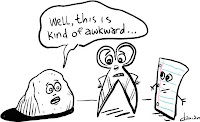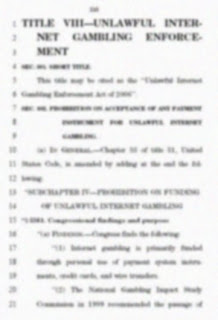A Sticky Issue
 Yesterday I read Bill Rini’s post in which he passed along some inside dope from Two Plus Two regarding strategy posts and “Grand Poobah” Mason Malmuth’s worry that the forums are negatively affecting the company’s book sales. If you didn’t happen to catch Bill’s post, here’s the skinny:
Yesterday I read Bill Rini’s post in which he passed along some inside dope from Two Plus Two regarding strategy posts and “Grand Poobah” Mason Malmuth’s worry that the forums are negatively affecting the company’s book sales. If you didn’t happen to catch Bill’s post, here’s the skinny:Back in May, 2+2 author Ed Miller put up a post on his popular “Noted Poker Authority” site announcing that “for the last nine months” he had been “receiving pressure and threats aimed at forcing me either to shut down Noted Poker Authority or to make the vast majority of its content available for pay only.” The upshot was that articles older than 30 days would no longer be accessible for free. Am not quite sure how the new system works or what the cost to view the older articles happens to be, but I do see that now one has to login in to see the older articles (such as that nice “shout out” Ed gave me back in January).
In any event, earlier this week Malmuth posted a message -- titled “Some Stickies Need to Be Modified” -- for the 2+2 moderators that begins with an allusion to Miller’s site. This message was apparently not intended to be seen by anyone other than the moderators, but a leak somewhere caused the message to be made public.
“Many of you are not going to like this,” Malmuth begins, “but we have had a terrible time with one of our authors creating a website with so much information on it that it was clearly going to destroy book sales.” 2+2 “is first and foremost a publishing company,” Malmuth points out, and apparently he has concluded that “many of our stickies are similar” in the way they deter readers from buying the company’s books.
The 2+2 forums work like most in that the most recent and most popular threads appear at the top of each individual forum. Forum moderators will create a “sticky” post whenever a particularly important topic comes up that needs to continue to appear at the top of the forum and not be pushed downward when newer threads are begun. For instance, in “News, Views, and Gossip” one finds a “UB scandal sticky” atop the page where many links to relevant posts/threads have been organized for readers’ convenience.
Some of the strategy-based forums had also begun collecting links to some of the best-received strategy posts into “stickies” for the same purpose -- i.e., to make life easier for the reader hoping to find these posts amid the hundreds of thousands that have been created since the site began back in 1997. (Actually, I’m not sure the site’s archival system currently allows one read posts from that far back, but you get the idea.)
In Malmuth’s note, he recognizes that while the site “contains a lot of quality information,” such information is a bit difficult to track down since it isn’t “readily accessible and well organized.” And what he’s noticed is “the stickies are doing just that,” that is, organizing the information in ways that make it easier for readers to access it. “Having links to lots of top quality posts may be serving as a substitute for book purchases,” worries Malmuth, so he is asking the moderators “to look at the stickies in your areas and consider deleting some of the links that can substitute for book purchases.”
My initial reaction to hearing this story was to chuckle at how a website’s owner can arrive at the conclusion that making his site less user-friendly is somehow in the site’s best interest. Malmuth and 2+2 have always been stubbornly iconoclastic (to their detriment, frankly) when it comes to all phases of book publishing -- from writing and editing to promotion and distribution -- so it isn’t at all surprising to see such a strange, backwards-seeming understanding of the relationship between different types of media (print and electronic) emerge from the same source.
I then recalled that little brouhaha that came up last December regarding an allegedly plagiarized passage appearing in Seven Card Stud for Advanced Players, a book co-authored by Malmuth and David Sklansky. I wrote a lengthy post about the dust-up then; you can read more about it there, if yr curious.
That little dust-up concerned a sample hand appearing in the pair’s book that was essentially identical to one that comes up in Chip Reese’s stud section of Super/System (published over a decade before). The similarity caused some to suggest the pair had stolen the material from Reese. As I said then, it appeared to me a fairly innocent slip on the part of the authors, though the pair’s mule-headed responses to the matter (in the 2+2 forums) revealed what I then described as a overly “functional view of style” wherein Malmuth and Sklansky both insist on quantifying things that simply cannot be quantified. Let me explain.
Defending himself against the charge of plagiarism, Sklansky posted the following dismissive comment on what happened: “But duh. Cmon. How easy would it have been for me to come up with a completely different example to perfectly describe the exact same concept? To ascribe this to anything other than an oversight is completely ridiculous. Chip’s chapter was very good but it was 50 pages. Our book has 300.”
That reference to the amount of pages at the end -- our book was six times longer than Reese’s section, chirps Sklansky, suggesting somehow it is six times more valuable -- is indicative of that tendency to overvalue quantity. But it is the idea that he could’ve picked a different example to illustrate the same concept -- and that making that sort of change would’ve somehow made the passage acceptable (and not plagiarism) -- that reveals an utter misunderstanding of the importance of form and its relation to content. And I think Malmuth’s directive to his moderators comes from the same sort of misapprehension about form and content Sklansky evinces in his defense against the plagiarism charge.
Malmuth believes that a significant number of visitors to the 2+2 forums who would have bought a 2+2 book decide not to because they can get all of the good, “quality information” on the site that they need. This view suggests that the form in which this information is presented is of no consequence -- that we don’t care whether it comes in a book written by a “noted poker authority” or via a post from some dude who goes by Butterfingers123. Just tell me what to do when my continuation bet on a raggedy flop gets check-raised by that LAG from UTG and I’m happy, right?
Wrong. While the centrality of print media in our culture has certainly been threatened in our electronic age, the formal differences between books and websites are so vast -- and significant -- one cannot reasonably argue that the 2+2 forums are going to “destroy book sales” for the company. Those of us who read books and want to read more books will continue to do so, no matter what “stickies” get created. And those of us who don’t read books still won’t read them, no matter what “stickies” get created.
Malmuth isn’t entirely indifferent to form, of course. After all, his primary worry here has to do with the formal characteristics of his website. He’d prefer the content of the site be presented in a less-organized, harder-to-navigate form, and is thus asking his moderators to help him achieve this goal by removing the helpful stickies. He seems thus to have some idea that form affects content -- that the content of his site (its usefulness, its value) will be affected by these changes to the site’s form.
But the attention to form here is utterly misplaced. If anything, the changes to the site’s form are intended to lessen the value of its content.
And to end on a less theoretical note, let’s think of the practical consequences of that change. If the site becomes less user-friendly, fewer will spend time on it. And thus fewer will become aware of the books. And fewer will buy them.
(EDIT [added 8/14/08, 5:30 p.m.]: It appears the message from Malmuth to the 2+2 mods was sent some time ago -- likely near the end of May, judging from the post count listed under Malmuth’s name in the message -- although it was not until earlier this week that it became known to anyone beyond the original recipients. Also, it looks as though after subsequent discussion the directive from Malmuth contained in the message was ultimately rescinded -- good news to those who appreciate the usefulness of the “stickies.” If you are curious, start here and read further to learn a bit more about the original message and its having been leaked this week.)
Labels: *the rumble, Bill Rini, David Sklansky, Ed Miller, Mason Malmuth, Two Plus Two
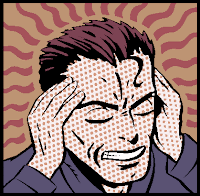



 in the big blind. Two players limped, and WildChild raised pot to $1.35. The player to his left called the raise, the small blind folded, and I went ahead and repopped it to $5.90. As I rule, I try not to go beserk with aces in PLO -- especially from early position -- but thought here I had a chance to isolate against what was likely a much inferior hand.
in the big blind. Two players limped, and WildChild raised pot to $1.35. The player to his left called the raise, the small blind folded, and I went ahead and repopped it to $5.90. As I rule, I try not to go beserk with aces in PLO -- especially from early position -- but thought here I had a chance to isolate against what was likely a much inferior hand. 


 , a perfectly silly hand for him to be holding here. Wouldn’t be so bad to be heads up versus just him. But SandCastle had
, a perfectly silly hand for him to be holding here. Wouldn’t be so bad to be heads up versus just him. But SandCastle had 


 , giving me a few more cards to fade. A six flopped, as did two hearts. But no third heart came, and I was stacked.
, giving me a few more cards to fade. A six flopped, as did two hearts. But no third heart came, and I was stacked.


 -- but I’d have probably still called a preflop raise given the fact that the button folded and I would be last to act for the rest of the way. Perhaps I might’ve bet out on the flop, but I’d imagine PoorSap might take one off with his gutshot straight draw. (Maybe not, I dunno.) In any event, once that turn card came, our fates were both sealed.
-- but I’d have probably still called a preflop raise given the fact that the button folded and I would be last to act for the rest of the way. Perhaps I might’ve bet out on the flop, but I’d imagine PoorSap might take one off with his gutshot straight draw. (Maybe not, I dunno.) In any event, once that turn card came, our fates were both sealed.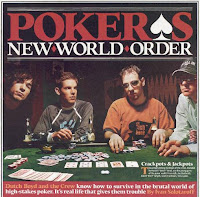
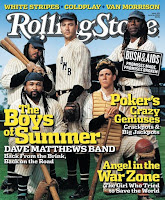
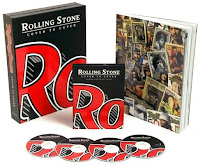
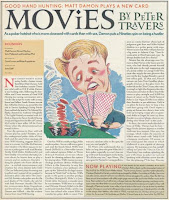





 . On the blog, I said “Bonomo didn’t take long to bet 200,000.” On the program last night it appeared Bonomo took about ten seconds to make his bet, and I think that was just about the actual time span. Then it appears de Wolfe takes about thirty seconds before making the call. (Bonomo had
. On the blog, I said “Bonomo didn’t take long to bet 200,000.” On the program last night it appeared Bonomo took about ten seconds to make his bet, and I think that was just about the actual time span. Then it appears de Wolfe takes about thirty seconds before making the call. (Bonomo had 
 , and de Wolfe took the pot.) On the blog, I reported that de Wolfe “went into the tank for several minutes” before making the call -- and I’m confident that was the case. I rarely would say “several minutes” in a post unless, indeed, at least 4-5 minutes had passed.
, and de Wolfe took the pot.) On the blog, I reported that de Wolfe “went into the tank for several minutes” before making the call -- and I’m confident that was the case. I rarely would say “several minutes” in a post unless, indeed, at least 4-5 minutes had passed. 
